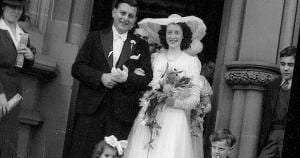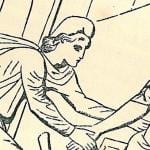Now I surely cease my anger; it is not fitting that I be wrathful, unrelenting forever.*
 So Achilles says, angry no more, after spending nineteen books dooming his friends because of his wrath. Few things are as dangerous on the Earth as an angry man. Achilles’ anger made men he liked a “feast for dogs and vultures.”
So Achilles says, angry no more, after spending nineteen books dooming his friends because of his wrath. Few things are as dangerous on the Earth as an angry man. Achilles’ anger made men he liked a “feast for dogs and vultures.”
Zeus “willed” it, but Achilles need not have been duped into being the fulfillment of this particular will of God. That’s not good. In fact, feelings are fatal when separated from the intellect and wicked when they deny the laws of Nature and of Nature’s God. Achilles is authentic to himself and ends up being truly Achilles as he is, but not Achilles as he should be. The man is reduced to his natural talent and not what could be made of those talents.
Why?
Achilles’ passions define him. If you asked him, he might say he is the angry young man, but Homer shows there is no future in it. Take his prize, his love, and he will grow anger and he has not learned to say “no” to his anger. Instead, Achilles blames the king, the gods, his fate. We are what we are, obviously, but Achilles learns too late that what we are, what we feel, is not the same as “should.”
”Should” condemns what we are, but frees us as well by giving us possibilities outside self. Anger is, but justice would have kept Achilles from allowing his real anger to destroy those he loved best.
Hope, my lady wife and not merely the virtue, told our daughters: “Never marry an angry man.” She learned from the classics. The angry man has not learned to master his desires: he is upset, so he is true to himself and acts on his anger. As Achilles friend, Patroclus, discovers: the angry man will revenge you, but only after his anger has killed you.
Angry men kill, even when they do “nothing.”
Achilles merely goes to his tent and sits out the war and this kills many of his friends. As the atom bomb of the ancient world, fatal if present, but rarely used, Achilles can change the war by not being there, merely being what he feels: angry. The wiseman stops, thinks about it, and does not do it.. The wiseman builds his house on a rock that is not part of the house, but is necessary for the house to survive.
When Achilles’ friend dies, then the “hero” is sorry he has done or left undone what he had done or left undone. Too late! His “is” had destroyed the “ought” of the world.
By contrast, the earliest Scriptures point past our desires to what is: good, true, and beautiful. The Virgin conceives and bears a son: small beginnings. The child Jesus grows up and becomes King and Lord. We are not as we should be, even without sin. Instead, what? ,
————————————————-
*Homer, The Iliad translated by Caroline Alexander Book 19, 65ff.












